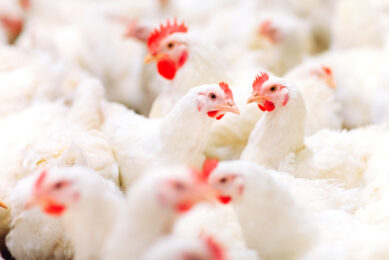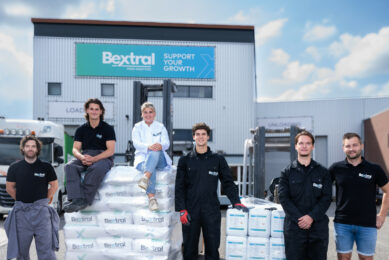Business update: Genus tackles PRRSv; Nutreco acquires

Every week, Pig Progress looks back on the previous week’s business news, conveniently capturing and summarising the most important business updates in the pig industry. Here are this week’s highlights.
Genus tackles PRRSv with breakthrough technology
Global animal genetics company, Genus, has developed the first pigs resistant to Porcine Reproductive and Respiratory Syndrome virus (PRRSv), through a long-standing collaboration with the University of Missouri. The production of PRRSv resistant pigs is a significant breakthrough in combating this devastating porcine disease. Even though it has challenged the pork industry for more than 25 years, there is currently no cure for PRRSv. The technology has the potential to eliminate the disease impact on the animals, improve the well-being of pigs, and enhance pig farm productivity, which ultimately will help meet the global demand for pork products.
Using precise gene editing, the University of Missouri was able to breed pigs that do not produce a specific protein necessary for the virus to spread in the animals. The early stage studies conducted by the University demonstrate these PRRSv resistant pigs, when exposed to the virus, do not get sick and continue to gain weight normally. Genus will continue to develop this technology, and we expect it will be at least five years until PRRS resistant animals are available to farmers. Genus intends to commercialise the technology through PIC, its porcine division.
Nutreco accelerates growth in feed additives
Nutreco has entered into an agreement with The Heritage Group, owners of Micronutrients, whose hydroxy trace minerals are marketed under the global brand name IntelliBond. The acquisition enables Trouw Nutrition, Nutreco’s animal nutrition business, to further strengthen its Selko Feed Additives portfolio. The transaction, which is subject to regulatory approvals, is expected to close in the first quarter of next year.
Knut Nesse, CEO of Nutreco: “Our strategy is to address global trends in the animal protein value chain by providing our customers innovative and sustainable nutritional solutions that require advanced technical and application know-how. Micronutrients’ product portfolio fits this strategy. In combination with our existing product range and R&D capabilities, the acquisition of Micronutrients makes our animal nutrition business Trouw Nutrition a leader in a specific feed additive segment. Furthermore, Micronutrients’ products will support our global premix value proposition.”
Minitube International opens subsidiary in the US
Minitube International will open Minitube USA on the 1st January 2016, a fully owned subsidiary, to service the US and Canadian markets. This marks Minitube’s eleventh international subsidiary with focus to meet the global needs of customers.
John Quackenbush, with more than 15 years of experience in the field of swine reproduction and Dr Steven Lorton, with more than 35 years of experience in the fields of artificial insemination and embryo transfer, will lead the Minitube USA team in Delavan, Wisconsin.
Lallemand launches liquid antioxidant solution
Lallemand Animal Nutrition has announced that its Melofeed Drink is now available to livestock producers. The product is an antioxidant solution based on a concentrated melon juice and pulp naturally rich in primary antioxidant enzymes, superoxyde dismutase (SOD) and catalases. The company is now launching the water-dispersible form of this antioxidant solution for use in the drinking water of all animal species.
Developed by Lallemand and Bionov and tested in farm trials with poultry, piglets and rabbits, the product is stable in water for 24 hours and ensures homogenous concentration of SOD. This new solution facilitates a flexible application of the antioxidant source, allowing rapid intervention at times of high oxidative challenges such as heat stress, vaccination, pathogen challenges and more. It can be incorporated directly into water lines on farms at the precise dosage and time of intervention for all animal species.
Genetic and pig management consultancy launched
A new consultancy company to provide a range of efficiency-enhancing services to pig producers and breeders in both the UK and overseas has been launched by geneticist, Ed Sutcliffe. Based in East Yorkshire, England, the aim of Data to Decisions is to assist with recording, retrieving, interpreting and managing data for both commercial and pedigree breeders to ensure herds are well managed for optimum performance.
A key component of this service is PigCom, the electronic recording service which Ed developed and which his company now owns. PigCom records and analyses production data and presents it in an understandable format. It enables trends in key performance indicators – such as changes in farrowing rate – to be identified to allow informed management decision-making. It will even assist producers to evaluate breeding stock from different sources or changes to service routines during on-farm trials.
Second biogas plant in South Korea for Weltec
The construction work for an anaerobic digestion plant from German manufacturer Weltec Biopower has started in South Korea. The plant site is located about 80 km north of the capital Seoul, in Gyeonggi-do province. The highly developed technology with smart control will ensure a high level of efficiency of the second South Korean Weltec plant.
Starting from the early summer of 2016, the operator will supply the stainless-steel digester with its capacity of almost 4,000 m³ with 100 tonnes of organic waste a day, whereof 70% are pig manure. This feedstock will be converted into biogas and high-quality fertiliser by anaerobic digestion. Subsequently, the fertiliser will be stored in two stainless-steel digestate storage units of 5,590 m³ each until it is used. The generated biogas will be used to operate a combined heat and power plant with an electrical output of 450 kW.











